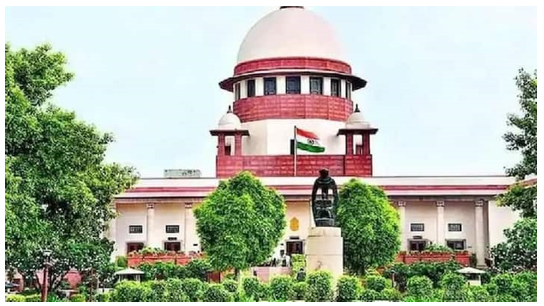- Courses
- GS Full Course 1 Year
- GS Full Course 2 Year
- GS Full Course 3 Year
- GS Full Course Till Selection
- Answer Alpha: Mains 2025 Mentorship
- MEP (Mains Enrichment Programme) Data, Facts
- Essay Target – 150+ Marks
- Online Program
- GS Recorded Course
- Polity
- Geography
- Economy
- Ancient, Medieval and Art & Culture AMAC
- Modern India, Post Independence & World History
- Environment
- Governance
- Science & Technology
- International Relations and Internal Security
- Disaster Management
- Ethics
- NCERT Current Affairs
- Indian Society and Social Issue
- NCERT- Science and Technology
- NCERT - Geography
- NCERT - Ancient History
- NCERT- World History
- NCERT Modern History
- CSAT
- 5 LAYERED ARJUNA Mentorship
- Public Administration Optional
- ABOUT US
- OUR TOPPERS
- TEST SERIES
- FREE STUDY MATERIAL
- VIDEOS
- CONTACT US
STATUS REPORT ON CASES OF HATE CRIMES SINCE 2018
STATUS REPORT ON CASES OF HATE CRIMES SINCE 2018
11-07-2023

Latest Context
The Supreme Court ordered the governments to report year-by-year information (starting in 2018) on the number of complaints, FIRs, and court challans related to incidences of hate crimes.
Key Points
- Hate crimes include mob lynchings and hate speech.
- In its 2018 decision (Tehseen S. Poonawala case), the SC provided a number of recommendations for preventative, corrective, and punitive actions to stop the rising number of lynchings:
- States should assign a senior police officer to each area to stop mob violent situations.
- Create expedited courts for similar instances.
- Lynching should be made into a distinct crime by the legislature.
- State governments must put out a plan for compensating victims of lynching and mob violence.
- In order to combat the threat of hate speech, the SC also issued a set of interim directives to numerous States and UTs in 2022, including:
- Hate speech cases shall be suo motu recorded and perpetrators should be prosecuted in line with the law.
- The SC emphasised certain Indian Penal Code (IPC) provisions (153A, 153B, 295A, etc.) to bring hate speech perpetrators to justice.
Facts about Hate Crimes
- Hate crimes are defined as acts of violence or abuse done against individuals or groups because of their religion, caste, race, sexual orientation, or other characteristics.
- These crimes target people or groups that are thought to be different or marginalised, and they frequently entail violent acts, acts of intimidation, or threats.
- Despite the fact that Article 14 of the Indian Constitution forbids discrimination on the basis of race, religion, caste, sex, or place of birth, hate crimes continue to be a major issue in the nation.
-
Indian Laws Against Hate Crimes:
- Due to the variety of forms, it might take, hate crime is neither adequately defined in Indian law nor is it simply reduced to a conventional description.
- However, the IPC deals with hate speech under Sections 153A, 153B, 295A, 298, 505(1), and 505(2), which state that any spoken or written words that incite hostility, hatred, or insults based on race, caste, ethnicity, culture, language, region, or any other factor are illegal and subject to punishment.
-
Major Factors Responsible for Hate Crime:
- Religious and Ethnic Tensions: India is a diverse nation with many distinct ethnic and religious groupings. Violence and hate crimes frequently result from these tensions.
- Caste-based Discrimination: Caste-based prejudice has a long history in India, which has led to the marginalisation of some communities and the commission of hate crimes against them.
- Lack of Political Will: Despite the existence of laws and regulations intended to prevent hate crimes, the lack of political will to properly enforce them has produced a climate where such acts are tolerated.
- Social Media and Misinformation: On social media, the propagation of hate speech and false information can exacerbate tensions and encourage the commission of hate crimes.
What are Possible Ways to Deal with Hate Crimes in India?
- Awareness Campaigns: Raising public awareness of hate crime's detrimental impact on both individuals and society at large is the first step in combating it. People can be informed about the effects of hate crime and encouraged to report such acts through media campaigns and community outreach initiatives.
- Community Engagement: Communities may be very helpful in combating hate crime. This may be accomplished by setting up areas where individuals can congregate and engage in direct, forthright conversation about the problems that separate them. Additionally, it can promote better respect and understanding amongst other cultures by acting as a bridge between them.
- Use of Technology: Technology can be used to improve reporting and tracking of hate crimes. This can include developing online reporting systems and using data analytics to identify trends and hotspots for hate crime.
- Restorative Justice Programs: Programmes for restorative justice seek to make things right between victims, criminals, and the community. When there has been a hate crime, these programmes can be utilised to help the affected communities heal and come together.
- Stiffer Penalties: The use of harsher punishments against individuals who participate in such behaviour is another strategy for combating hate crimes. This may dissuade others from considering committing hate crimes in the future.
Must Check: IAS Coaching Centre In Delhi



